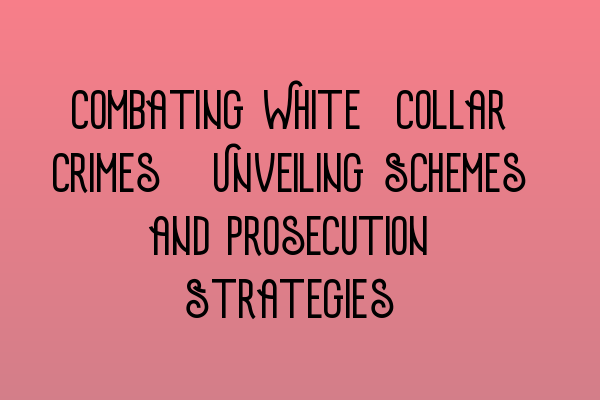Combating White-Collar Crimes: Unveiling Schemes and Prosecution Strategies
White-collar crimes have been on the rise in recent years, posing significant challenges to both individuals and the criminal justice system. The sophisticated nature of these crimes, coupled with the involvement of influential individuals and intricate schemes, necessitates a comprehensive approach towards their detection, investigation, and prosecution.
At SQE Criminal Law & Practice Law UK, we understand the urgency and gravity of combating white-collar crimes. In this blog post, we will delve into the various schemes employed by perpetrators and shed light on effective prosecution strategies to bring them to justice.
Schemes Unveiled
White-collar crimes encompass a broad range of illegal activities perpetrated by individuals within organizations or businesses. These crimes are typically financially motivated and often involve deceit, fraud, or abuse of power to gain economic advantages. To effectively combat white-collar crimes, it is crucial to understand the schemes employed by offenders. Let’s explore some common schemes:
Ponzi Schemes
Ponzi schemes lure investors by promising high financial returns. However, rather than generating legitimate profits, these schemes use investments from new participants to pay off earlier investors. The unsustainable nature of Ponzi schemes eventually leads to their collapse, leaving victims with substantial financial losses.
Embezzlement
Embezzlement involves the misappropriation or theft of funds entrusted to an individual within an organization. Perpetrators exploit their positions of trust, bypass internal control mechanisms, and divert funds for personal gain. Embezzlement can occur in various ways, such as fraudulent billing, fictitious expenses, or unauthorized transfers.
Insider Trading
Insider trading occurs when individuals with access to privileged information about a publicly traded company use that information to make profitable stock transactions. This unfair practice undermines market integrity and erodes public trust in financial systems.
Money Laundering
Money laundering is the process of concealing the origins of illegally obtained funds to make them appear legitimate. This scheme involves a series of complex transactions and structures, aiming to distance the illicit funds from their criminal source.
Securities Fraud
In securities fraud, individuals deceive investors by providing false or misleading information regarding investments or securities. This scheme often involves making untrue statements, omitting important facts, or engaging in manipulative trading practices to manipulate stock prices for personal gain.
Prosecution Strategies
Effectively prosecuting white-collar criminals requires a strategic approach that takes into account the complexities of these crimes and the legal intricacies involved. Here are some strategies employed by prosecutors:
Investigation and Evidence Gathering
A thorough investigation and collection of evidence are crucial to build a strong case against white-collar criminals. Law enforcement agencies employ various methods, such as financial analysis, forensic accounting, and surveillance, to uncover the intricate details of these crimes and gather evidence that can withstand scrutiny in court.
Collaboration and Information Sharing
To combat white-collar crimes, collaboration between law enforcement agencies, regulatory bodies, and financial institutions is essential. Sharing information and expertise helps identify suspicious activities, track illicit funds, and dismantle criminal networks.
Enhanced Legislation
The legal framework surrounding white-collar crimes must keep pace with evolving criminal methods. By enacting comprehensive legislation, lawmakers can provide prosecutors with the necessary tools to effectively investigate and prosecute offenders.
Asset Recovery
White-collar crimes often involve significant financial gains for perpetrators. Identifying and recovering these ill-gotten assets is a crucial aspect of the prosecution process. Effective asset recovery measures can not only serve as a deterrent but also compensate victims and ensure justice is served.
Effective combating and prosecuting white-collar crimes requires a multidisciplinary approach, involving legal expertise, technological advancements, and collaboration across various sectors. At SQE Criminal Law & Practice Law UK, we specialize in providing comprehensive SQE 2 Preparation Courses as well as SQE 1 Preparation Courses to equip aspiring solicitors with the necessary knowledge and skills to tackle these complex crimes.
Stay informed on the latest developments in the legal field and prepare for the SRA SQE exams by referring to our related articles:
- SQE 1 Practice Exam Questions
- SQE 1 Practice Mocks FLK1 FLK2
- SQE 2 Preparation Courses
- SQE 1 Preparation Courses
- SRA SQE Exam Dates
By actively pursuing measures to combat white-collar crimes and staying abreast of legal developments, we can collectively work towards a fair and transparent system that safeguards financial integrity and upholds justice.
